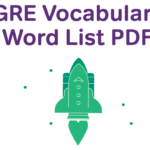If you read this week’s posts, you know how to be a full-fledged word detective. You also have the vocabulary books that provide you with the best prep. Now, we need to talk about the process of getting words to stick in your head.
Making GRE Vocabulary Words Stick
Below is the magical formula for helping words stick.
Come up with Clever (and Wacky) Associations
Another way of saying this: use mnemonics. A mnemonic is a creative way of remembering a word.
Let’s take the words gregarious and amiable. Gregarious means sociable. Say I have a friend named Greg, and, indeed, he is outgoing. Now, I have a way of remembering this word. As luck would have it, I also have a friend named Amy who, believe it or not, is friendly. So now, when I see amiable I think Amy-able and for gregarious I think Greg-arious.
Wait a second, you may be thinking. I don’t know anybody who has those names. That’s the whole point of a mnemonic — it needs to make sense only to you.
Granted, the words above didn’t have very interesting mnemonics. And, if you notice in the caption, I mentioned the word wacky. The wackier and sillier a mnemonic, the more likely you are to remember it. And the mnemonics that make the most sense to you are usually the ones that you come up with your own.
So give it a try with the following words:
Esoteric – known only to those with specialized knowledge
Dilatory – slow; delaying
Polemic – a written or verbal attack against someone
Use It or Lose It
Let’s say you don’t know the definitions of any of the words above. So you look them up in a dictionary. Being the good word detectives you are, you write down the definitions, as well as an example sentence on a flashcard.
However, tomorrow your friend asks you what you learned on Magoosh. You tell them that you learned how to use mnemonics for three words. You remember the words, but you can’t remember the definitions. Now, say that you decided after reading my posts to read an article from The New Yorker. While reading the article you think to yourself, “Hey this is some pretty….oh, oh…what’s that word…esoteric stuff”.
Now, what’s happened? Well, you’ve recalled a word and used it in a relevant context. Calling forth a word in this fashion will embed it deeper into your memory. That way, when it comes time for the test, you will spend very little brainpower processing the word.
So, whether you are walking down the street, or even watching a television show, see if you can’t apply the words you learnt that day (or even the previous days). If you think that GRE prep ends as soon as you put down your vocabulary books, then you will have a tougher time learning words. Use words (even if discreetly to yourself) whenever you can. Your verbal score will thank you.
Do Not Bite Off More Than You Can Chew
Learning hundreds of words while only having a tenuous grasp of them is not efficacious. There is a word for this method: cramming.
Instead, learn words, but at a rate where they are not falling out of your head. For some, this rate is five words a day. For others, it’s twenty-five. My experience is that students fare best when they start with a few words per day, but then increase the number. Oftentimes, your brain simply needs to adapt to something it is not used to doing, e.g. learning vocabulary.
Read to be Surprised
In this week’s posts, I’ve discussed, perhaps ad nauseam, the importance of reading. I’ve also referenced magazines such as The New Yorker, which is filled with vocabulary words used in a stylistically advanced context. Beyond context, there is another reason why we should read in conjunction with learning vocabulary.
Imagine that you pick up the copy of the Economist (we’ll give The New Yorker a rest for now). In there, you see the word dilatory. Look familiar? Well, your brain should have a sudden jolt of recognition: we just saw the word in the mnemonics exercise above. Now that you’ve encountered a word you learnt as part of your word list, but weren’t necessarily expecting to see in the Economist, your brain is suddenly more likely to retain it.
As you continue to learn words, and as you continue to read, you will have more of these epiphanic moments. Sometimes you won’t remember the word immediately, but you can always look it up to reinforce the definition.
Takeaways:
- — Use words and use them often
- — Find creative and wacky ways to remember words
- — Read, read, and read some more
Sometimes, it’s hard to figure out where exactly to start in your GRE vocab learning journey. To help you out, we’ve created this quiz! Just answer a few questions about your vocab level, and we’ll recommend the right FREE GRE vocabulary flashcard set for you!






Leave a Reply